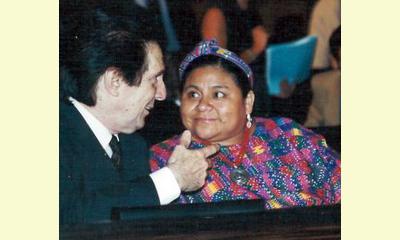|
|
The Three Heroines of Guatemala: The Judge, the Attorney General and the Nobel Peace Laureate
un articulo por Amy Goodman, Truthdig
Video: Rigoberta Menchu hails genocide verdict
Former Guatemalan President Efrain Rios Montt was hauled off to prison last Friday. It was a historic moment, the first time in history that a former leader of a country was tried for genocide in a national court. More than three decades after he seized power in a coup in Guatemala, unleashing a U.S.-backed campaign of slaughter against his own people, the 86-year-old stood trial, charged with genocide and crimes against humanity. He was given an 80-year prison sentence. The case was inspired and pursued by three brave Guatemalan women: the judge, the attorney general and the Nobel Peace Prize laureate.

Rigoberta Menchu, along with fellow Nobel Peace Laureate Adolfo Perez Esquivel, at the launching ceremony of the International Year for the Culture of Peace
click on photo to enlarge
“My brother Patrocinio was burnt to death in the Ixil region. We never found his remains,” Rigoberta Menchu told me after Rios Montt’s verdict was announced. She detailed the systematic slaughter of her family: “As for my mother, we never found her remains, either. ... If her remains weren’t eaten by wild animals after having been tortured brutally and humiliated, then her remains are probably in a mass grave close to the Ixil region. ... My father was also burned alive in the embassy of Spain [in Guatemala City] on January 30th, 1980.”
Rigoberta Menchu was awarded the Nobel Peace Prize in 1992, “in recognition of her work for social justice and ethno-cultural reconciliation based on respect for the rights of indigenous peoples.” She continued telling me about her family’s destruction: “In 1983, my brother Victor Menchu was also shot dead. His wife had her throat slit, and he was fleeing with his three children. Victor was jailed in the little town, but his three children were kept in a military bunker. My two nieces died of hunger in this military base, and my brother Victor was shot. We still have not found his remains.”
According to the official Commission on Historical Clarification, which undertook a comprehensive investigation of Guatemala’s three-decade genocide, at least 200,000 people were killed. Menchu brought one of the original lawsuits against the perpetrators of the genocide, which resulted in the trial that ended with Rios Montt’s conviction.
Claudia Paz y Paz Bailey was appointed as Guatemala’s first female attorney general in December 2010, and has earned wide acclaim for her pursuit of perpetrators of crimes against humanity. The judge in the case is another woman, Yassmin Barrios. In a country where, historically, people who challenge those in power are often killed, Paz y Paz and Barrios demonstrated tremendous courage.
[Note: Thank you to Janet Hudgins, the CPNN reporter for this article.]
This article is continued on the Discussionboard.
|








|
DISCUSSION
No hay pregunta ligada a este article.
* * * * *
Comentario más reciente:
(The following is continued from the main article listed above.)
Journalist Allan Nairn, who has covered Guatemala,
among other conflict zones, since the early 1980s,
observed the trial. In mid-April, the trial was
ordered shut down by another Guatemalan court,
presumably under the influence of President Otto
Perez Molina. From Guatemala City, Nairn reported
then: “The judge, Yassmin Barrios, and the
attorney general, Claudia Paz y Paz, both say
they’re going to defy this order to kill the case,
which is extraordinary.” They continued the trial,
and eventually Rios Montt was found guilty. Nairn
said, after the verdict: “Judge Barrios ... ran
the trial. She was the one who had to deliver the
verdict. As she left the courthouse every night,
you could see her wearing a bulletproof vest. The
judges and prosecutors involved in the case
received death threats. . ... continuación.

|
|









